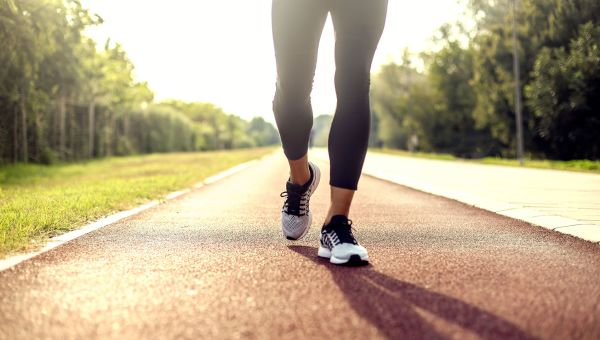Walking: the simple, free way to improve your health
Among its many benefits may be less stress, a lower risk of heart problems, and better sleep.
Updated on March 3, 2025

Looking for a simple way be fit and improve your overall health? Take a walk.
“Walking, like other forms of exercise and activity, is purposeful. We feel empowered and in control of our bodies," says Alan Young, MD, a physician in Grandville, Michigan. "This benefit—achievement—of walking, if you will, can’t be understated.”
For health benefits, experts… Show More
Looking for a simple way be fit and improve your overall health? Take a walk.
“Walking, like other forms of exercise and activity, is purposeful. We feel empowered and in control of our bodies," says Alan Young, MD, a physician in Grandville, Michigan. "This benefit—achievement—of walking, if you will, can’t be understated.”
For health benefits, experts recommend that adults get at least 150 minutes of moderate-intensity activity, such as brisk walking, each week. Doing 75 minutes of vigorous activity such as jogging or running, is an alternative. But any movement helps, and it's okay to start small and build up over time.
Regular walking can better your sleep, enhance your mood, reduce your risk for heart disease, and much more. Here's what to know.
Show Less
It can lower your risk of heart problems
“Walking helps decrease inflammation, reduce blood pressure, and lower risk of type 2 diabetes, which are risk factors for heart attack and stroke,” explains Dr. Young. It can also help to manage weight, improve blood flow, and keep cholesterol levels in check—all of which protect against heart… Show More
“Walking helps decrease inflammation, reduce blood pressure, and lower risk of type 2 diabetes, which are risk factors for heart attack and stroke,” explains Dr. Young. It can also help to manage weight, improve blood flow, and keep cholesterol levels in check—all of which protect against heart disease.
There’s evidence that the more you walk and the faster you walk, the greater the benefits. It may even lower your risk of dying from diseases of the heart and blood vessels.
Show Less
It relieves stress and anxiety
Exercise is a proven stressbuster. Getting regular physical activity—like walking—helps increase the production of “feel-good” hormones like endorphins. It helps to manage levels of stress hormones like cortisol and adrenaline, as well.
Walking also allows you to step away from digital distractions,… Show More
Exercise is a proven stressbuster. Getting regular physical activity—like walking—helps increase the production of “feel-good” hormones like endorphins. It helps to manage levels of stress hormones like cortisol and adrenaline, as well.
Walking also allows you to step away from digital distractions, work deadlines, and other anxiety-inducing tasks to help you focus on your breath and center your thoughts.
For extra benefits, head outside. Walking in nature can soothe your body and mind—and in many ways, the calming aspect of being outdoors can give you new perspective. “The canopy of trees provides a shelter from harsher weather elements, such as bright sunlight, temperature, variability, loud noise, and wind,” Young says.
Show Less
It can improve quality of life for cancer patients
As they are able, people with cancer should try to remain physically active while undergoing treatment. Activities like walking can increase energy levels, help maintain function, prevent wasting muscle, and lessen fatigue, a common side effect of treatment.
Walking may even be empowering. “I think… Show More
As they are able, people with cancer should try to remain physically active while undergoing treatment. Activities like walking can increase energy levels, help maintain function, prevent wasting muscle, and lessen fatigue, a common side effect of treatment.
Walking may even be empowering. “I think that there’s a very positive psychological effect from taking control and exercising in a situation that often leads to people feeling powerless,” Young says.
Speak to your healthcare team about a walking program that's right for you.
Show Less
It can help you sleep better
Lack of sleep or poor-quality sleep can slow productivity and reaction time, impair thinking and decision making, and disrupt focus. Over the long term, it’s linked to chronic illnesses like heart disease and type 2 diabetes.
But research suggests that walking can help improve sleep,… Show More
Lack of sleep or poor-quality sleep can slow productivity and reaction time, impair thinking and decision making, and disrupt focus. Over the long term, it’s linked to chronic illnesses like heart disease and type 2 diabetes.
But research suggests that walking can help improve sleep, including how long you sleep and how many times you wake up. This is partly because of how walking affects your mind.
“Regular exercise, such as walking, has been shown to reduce depression, anxiety and stress. All of these have a negative impact on our sleep quality,” says Young. "I feel that reducing these three factors is what leads to an improvement in insomnia."
There’s no best time to walk for better sleep. But know that vigorous exercise too close to bedtime may make it tough for some people to doze off. If you feel overstimulated by evening walks, try aiming for earlier in the day.
Show Less
It can ease joint pain
If you have osteoarthritis, joint pain is likely a fact of life. But low-impact exercises like walking have been found to ease pain and help maintain function in people with the condition. Walking does this by strengthening the muscles around your hips and knees, as well as lubricating your joints.… Show More
If you have osteoarthritis, joint pain is likely a fact of life. But low-impact exercises like walking have been found to ease pain and help maintain function in people with the condition. Walking does this by strengthening the muscles around your hips and knees, as well as lubricating your joints. Try easy hikes, taking your dog for a stroll or enlisting a walking buddy. To see how far you’ve walked, use the steps tracker on the Sharecare app, which you can find on both iOS and Android.
And if you don’t have arthritis? Walk anyway. Regular exercise may help to keep it from developing.
Show Less
It may help maintain cognition over time
Some research suggests that long-term regular exercise, such as walking, is tied to better cognition and potentially less cognitive decline. Cognition is the ability to think, learn, remember, focus, and perceive.
This may be because walking helps to maintain brain health, partly by promoting… Show More
Some research suggests that long-term regular exercise, such as walking, is tied to better cognition and potentially less cognitive decline. Cognition is the ability to think, learn, remember, focus, and perceive.
This may be because walking helps to maintain brain health, partly by promoting neural development and good blood flow to the brain. It may also help to slow the brain itself from breaking down over time.
Show Less
Centers for Disease Control and Prevention. Arthritis: About Physical Activity and Arthritis. February 14, 2024.
Hicham Skali, MD, MSc. Walking for Heart Health. Massachusetts General Brigham. February 21, 2025.
Banach M, Lewek J, Surma S, Penson PE, et al. The association between daily step count and all-cause and cardiovascular mortality: a meta-analysis. Eur J Prev Cardiol. 2023 Dec 21;30(18):1975-1985.
American Heart Association. Walking your way to better health? Remember the acronym FIT. April 6, 2022.
UCLA Health. Walk this way: How to make walking all the cardiovascular exercise you need. July 29, 2021.
Harvard Health Publishing. Exercising to relax. July 7, 2020.
Mayo Clinic. Exercise and stress: Get moving to manage stress. August 3, 2022.
Kelsey Graham. Get Out! 5 Benefits of Outdoor Exercise. American Council on Exercise. June 14, 2024.
American Cancer Society. Physical Activity and the Person with Cancer. March 16, 2022.
National Heart, Lung, and Blood Institute. How Sleep Affects Your Health. June 15, 2022.
Sullivan Bisson AN, Robinson SA, Lachman ME. Walk to a better night of sleep: testing the relationship between physical activity and sleep. Sleep Health. 2019 Oct;5(5):487-494.
Hori H, Ikenouchi-Sugita A, Yoshimura R, Nakamura J. Does subjective sleep quality improve by a walking intervention? A real-world study in a Japanese workplace. BMJ Open. 2016 Oct 24;6(10):e011055.
Harvard Health Publishing. Does exercising at night affect sleep? July 24, 2024.
Arthritis Foundation. Building a Walking Workout. Accessed March 3, 2025.
Lo GH, Vinod S, Richard MJ, Harkey MS, et al. Association Between Walking for Exercise and Symptomatic and Structural Progression in Individuals With Knee Osteoarthritis: Data From the Osteoarthritis Initiative Cohort. Arthritis Rheumatol. 2022 Oct;74(10):1660-1667.
Nationwide Children’s. How to Help Prevent Osteoarthritis. September 1, 2023.
Cleveland Clinic. Arthritis. November 13, 2023.
Kang SJ, Kim BH, Lee H, Wang J. The Beneficial Effects of Cognitive Walking Program on Improving Cognitive Function and Physical Fitness in Older Adults. Healthcare (Basel). 2021 Apr 5;9(4):419.
American Psychological Association. Cognition and the brain. Accessed March 3, 2025.
More On


video

article

slideshow


video


video
